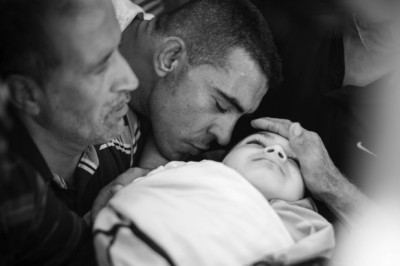By?Kelly Lynn

Thousands gathered shortly before afternoon prayers on Sunday in Fawwar refugee camp south of the occupied West Bank city of?Hebron?to mourn the death of eleven-year-old Khalil Muhammad al-Anati.
Israeli soldiers shot Khalil with live ammunition outside his home that same morning on 10 August after forces invaded the camp. He was buried not far from his home that afternoon by thousands of friends, family and neighbors.

The body of eleven-year-old Khalil Muhammad al-Anati is carried inside the local mosque for funeral prayer.?(Kelly Lynn)

Following funeral prayer inside the local mosque, Khalil?s body is carried down Fawwar camp?s main thoroughfare with the participation of thousands of mourners. (Kelly Lynn)
Witnesses say camp residents responded to the presence of soldiers by throwing stones but that the slain boy was not involved in the confrontation.
Muhammad Yusif, 21, was present when the boy was shot. He said Khalil was on an errand to buy something for his mother when an army jeep pulled up near his home and a soldier shot him in the back while he was attempting to hide.
Bystanders attempted to aid Khalil but were prevented by additional live fire.

Female family and friends shout anti-occupation chants as Khalil?s body is carried past them.?(Kelly Lynn)

Family members mourn and assist in preparing the small grave to be covered.?(Kelly Lynn)

Khalil?s body is carried through Fawwar camp, gathering hundreds of mourners along the way.?(Kelly Lynn)
Left to bleed to death

Khalil?s father pauses during the burial of his son.?(Kelly Lynn)
?Every time someone went to get him, the soldiers would start shooting. We couldn?t reach him. When we were finally able to get to him, he had lost almost all of his blood,? Yusif said.
After the jeeps vacated the area, Khalil was taken in a private car to al-Ahli hospital in Hebron, where he was treated by Dr. Mohammed Baker Abu Snaina.
?Upon arrival to our emergency room, he had no heartbeat, no pulse and no muscular or neurological reflexes,? said Abu Snaina. ?There was no active bleeding because he had already lost most of his blood.?
Video, sound and editing by Becky Anne; additional editing by Sara Anna; interview by Kelly Lynn; translation by Mustafa Alaraj and Muhanad Quaisy.
The live bullet entered the lower right side of Khalil?s back and left an eight by five centimeter exit wound in his lower abdomen, exposing muscle and arteries. Doctors administered fluids before pronouncing Khalil dead shortly after arrival.
The Israeli army media desk declined to answer this reporter?s queries regarding the incident. But a few hours following the shooting, the Israeli military?s Twitter account?stated in Hebrew?its ?regret? over the incident, promising an internal investigation.

Khalil?s father stands inside his son?s grave waiting to receive the body for burial near the small mound of dirt that assures the body lays on its right side as indicated in the Quran, facing Qibla, the direction of Mecca.?(Kelly Lynn)

A family member gives Khalil a final kiss before the child is laid to rest. (Kelly Lynn)

Khalil?s father mourns among family as his son?s grave is sealed. Sporadic nationalist chants break up a religious leader?s sermon in the background. (Kelly Lynn)
Impunity
According to?Amnesty International?s?February 2014 report titled ?Trigger Happy: Israel?s Use of Excessive Force in the West Bank,? Israeli authorities have consistently failed to carry out investigations into alleged crimes that satisfy international standards.
From September 2000 until June of last year, there were only sixteen military police investigations into the killings of Palestinian civilians by Israeli forces which led to indictments. None led to discharge from the military, according to Amnesty.

A family member is consoled as he sits near Khalil?s sealed grave.?(Kelly Lynn)

Family mourn near Khalil?s grave as it is sealed with concrete.?(Kelly Lynn)

Khalil?s grandfather recites prayers next to the grave as its covered with concrete and plastic floral wreaths.?(Kelly Lynn)
Amnesty describes ?a harrowing pattern of unlawful killings and unwarranted injuries of Palestinian civilians by Israeli forces in the West Bank.?
Last year a six-year-old boy?lost an eye?in Fawwar refugee camp after an Israeli soldier fired a steel-coated rubber bullet at him as the child was walking with his parents.

A young man leads a call and response as Khalil?s grave is prepared by a grave keeper and family.?(Kelly Lynn)

Family and friends mourn after the grave is sealed. Hundreds gathered on the hillside to observe the burial.?(Kelly Lynn)

A flyer announcing the death of Khalil rests on wet cement next to plastic flowers laid atop his grave.?(Kelly Lynn)
Abu Snaina reported seeing more than forty cases of people injured from live ammunition by the Israeli military in Hebron?s al-Ahli hospital over the past month.
Clashes have been increasingly quelled with live ammunition since protests erupted after the death of sixteen-year-old?Muhammad Abu Khudeir?in Jerusalem on 2 July. At least eighteen Palestinians have been?killed?in the last month by Israeli forces throughout the West Bank as residents protest Israel?s latest?onslaught on Gaza?which began on 7 July.
Kelly Lynn is a freelance photojournalist based in the West Bank. Her work focused on refugee communities in the southern West Bank has been published on New Internationalist, Vice, Mondoweiss and others. She can be followed on Twitter:@kellylynn194.




Leave a Reply
You must be logged in to post a comment.